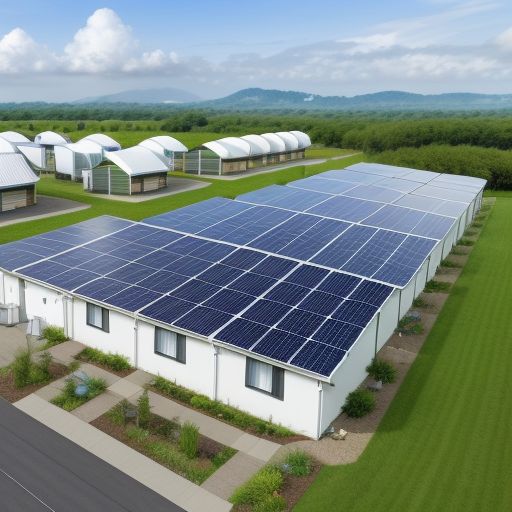
Sustainability has become a core focus for businesses worldwide. The shift to environmentally conscious practices is not just ethical—it’s profitable and essential for long-term success. As we step into 2025, these eco-friendly business trends are set to redefine how companies operate and thrive.
Eco-friendly business trends involve adopting sustainable practices to reduce environmental harm while boosting efficiency and profitability. These trends encompass renewable energy, zero-waste systems, and sustainable supply chains, making businesses more resilient and appealing to eco-conscious consumers.
Companies are increasingly relying on renewable energy sources like solar, wind, and geothermal. These energy solutions not only cut costs but also lower carbon emissions. For example, Tesla and Apple have pioneered the use of solar and wind energy in their facilities, setting a benchmark for other industries.
Biodegradable and reusable packaging is becoming standard practice. Brands like Unilever and Lush are leading the charge with sustainable packaging innovations, drastically reducing plastic waste. The growing consumer demand for zero-waste products has made this a must-adopt trend.
Businesses are leveraging energy-efficient machinery and AI-powered systems to streamline their operations. Green tech not only reduces operational waste but also enhances productivity, helping companies meet sustainability goals.
Instead of the traditional take-make-dispose model, businesses are adopting circular economies. This approach involves reusing, recycling, and repurposing materials, creating a closed-loop system that minimizes waste. Companies like IKEA are setting examples with their furniture recycling initiatives.
Transparency in supply chains is becoming a priority for businesses. Eco-conscious consumers value brands that source responsibly and ensure their suppliers follow ethical and sustainable practices. For instance, Patagonia’s focus on sustainable sourcing has strengthened its reputation.
Green marketing is an essential eco-friendly business trend that emphasizes sustainability in branding. It involves showcasing products and services as environmentally friendly while maintaining transparency and authenticity. Verified claims like “organic,” “recycled,” or “biodegradable” resonate with eco-conscious customers and build trust.
Social media platforms have amplified green marketing efforts, allowing brands to visually showcase their eco-friendly initiatives. From posting behind-the-scenes recycling practices to promoting green campaigns, businesses can directly engage with their audience. Additionally, partnerships with environmental organizations further enhance credibility.
Incentivizing consumers through programs like discounts for recycled products fosters loyalty while reinforcing sustainable values. Green marketing goes beyond boosting sales—it aligns businesses with long-term environmental goals and creates a lasting positive impact.
Eco-friendly materials and innovative designs are transforming industries. From energy-efficient appliances to biodegradable clothing, sustainable product design meets growing consumer demand for green alternatives.
The pandemic popularized remote work, and its environmental benefits are undeniable. By reducing commuting emissions and office energy consumption, remote work has become a key sustainability trend.
Businesses are increasingly partnering with local suppliers to minimize transportation emissions and support local economies. Local sourcing strengthens community ties while reducing the environmental footprint of production.
Carbon offsetting allows businesses to balance their emissions by investing in renewable energy, reforestation, or similar initiatives. Major companies like Google and Microsoft have pledged to become carbon neutral, inspiring smaller businesses to follow suit.
Educating consumers about sustainability is a growing trend. Businesses use blogs, social media, and workshops to inform customers about eco-conscious practices, fostering a culture of shared responsibility.
The adoption of renewable energy is a pillar of sustainable business trends. But businesses across the world are increasingly making the case to shift to clean energy such as solar, wind, and geothermal energy. Solar panels are no longer just on the rooftops of tech giants like Apple; small businesses have adopted them to save on electricity costs and shrink carbon footprints.
Wind energy is another sustainable alternative, with companies teaming with wind power farms to sustainably power operations. Firms in manufacturing and logistics — sectors with a reputation for high energy use — are establishing aggressive renewable energy goals.
The other major economic advantage of renewable energy is not just cost savings. Numerous governments around the world have incentives and tax breaks for companies that invest in clean energy. These factors, combined with increasingly prolif-erating installation costs associated with solar and wind systems, have never made renewable energy adoption more feasible.
Investing in renewable energy helps businesses lower operational costs, improve brand image, and play a crucial role in achieving global sustainability targets. This isn’t merely a strategy, however; it’s a pledge to a more sustainable tomorrow.
1. What are eco-friendly business trends?
Eco-friendly business trends refer to sustainable practices like renewable energy adoption, zero-waste packaging, and green marketing that reduce environmental impact while boosting business efficiency.
2. Why are eco-friendly business trends important?
These trends align businesses with global sustainability goals, meet consumer demands for ethical practices, and drive long-term profitability.
3. How can small businesses adopt eco-friendly practices?
Small businesses can adopt eco-friendly practices by reducing waste, using renewable energy, sourcing locally, and promoting sustainability through green marketing.
4. Which industries benefit most from eco-friendly trends?
Retail, manufacturing, technology, and e-commerce industries benefit significantly from adopting eco-friendly trends.
Eco-friendly business trends are reshaping industries and creating new opportunities for growth and sustainability. From renewable energy adoption to innovative green marketing strategies, these trends offer both environmental and economic benefits.
Ready to future-proof your business? Start adopting eco-friendly practices today and make a positive impact on the world.